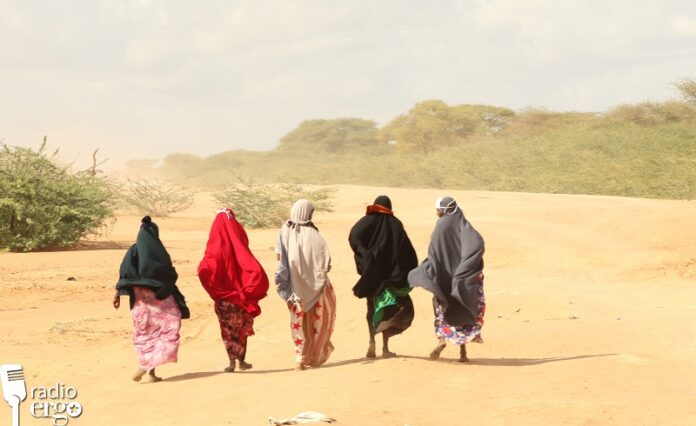
Hawo Ali Yarow, a Somali mother of 12, makes the long, dusty trek to Dadaab town from her refugee camp in northern Kenya at least 20 times a month in search of work.
It feels like a long seven kilometres each way – and with local transport locked down due to Coronavirus restrictions, there is no chance these days of getting a lift even part of the way.
“Some days I find work and some days I don’t, but I have to continue because I have children at school and they want everything,” Hawo said.
“The children don’t even have enough food, the small rations we get from [international aid agency CARE finish quickly.”
Hawo came to the Dadaab refugee camps in 2011 after severe drought caused widespread hunger in her home area of Salagle in southern Somalia’s Lower Juba region, where the family were small-scale farmers.
She is one of 50 refugee women from Ifo camp who walk to Dadaab desperately seeking odd jobs to supplement the little aid they get as refugees from humanitarian organisations.
Idamo Osgo Hassan occasionally gets work as a maid in Dadaab, but the money is never reliable nor enough to cover her family’s needs. Sometimes she walks all the way to town to be told that her regular employer does not need her service that day, so she goes looking for other small jobs to earn a few extra shillings.
Idamo is the only breadwinner in her family and supports her three children, aged between two and 10, and her unemployed husband.
“We only eat twice a day. For breakfast we normally have bread and beans, and we are lucky if we can have tea with that,” she said.
Muslimo Isaq Ali, a single mother of three, told Radio Ergo that she detests her cleaning job but she has no other means of supporting her family. The job would perhaps be more tolerable if she did not have to face the long walk.
“We are really tired! Imagine a mother walking back and forth such a long distance almost every day! But this is life, this must be our destiny,” said Muslimo, resignedly.
As well as being arduous, the walk through bushy and wooded areas puts the women in danger of attack, so they always try to stay in groups.
“Once when I was walking alone, I was attacked by a man and I could not get him off of me. Luckily three boys from Ifo heard my screams and came to my rescue,” Muslimo said, describing one narrow escape from being raped on the road.
“This route can be dangerous, but we keep on it because we need the work,” she said.
Source: Radio Ergo


